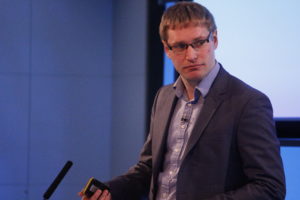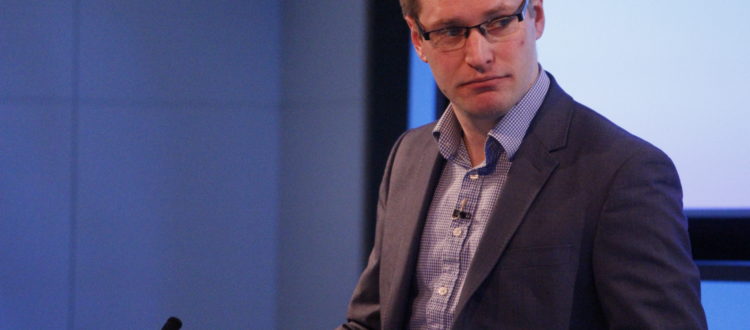3 reasons Financial Times is winning at digital engagement
Financial Times, which recently created an audience development team in the heart of the newsroom, has had a huge boost in digital engagement. Tom Betts, the media company’s chief data officer, discussed FT’s recent success at the Big Data for Media Week conference on Thursday.
“The FT is winning when it comes to digital. More people than ever are paying for our journalism — with 835,000 subscribers and subscriptions continue to grow significantly,” Betts said.
So how did the FT reach such success? Betts focused on this journey, reflecting that just five years ago, print was still the dominant format for most users. Now that landscape has changed, with 70% of readers paying for digital access.
 “Data has been one of if not the key catalyst for our digital growth and digital business,” he explained, outlining the three main aspects of how FT initiated its institutional experiments:
“Data has been one of if not the key catalyst for our digital growth and digital business,” he explained, outlining the three main aspects of how FT initiated its institutional experiments:
- Not Big Data: Betts explainedFT’s push to move beyond Big Data and away from the idea that the data team is the sole barer of data information: “There are no departments left untouched by the data team.”
- Unified goals: Unifying goals across FT has been a crucial stepping stone for its success. FT put all its energy in engagement as the key metric, focusing on reader loyalty and habit formation. Engagement has been strongly linked to revenue, as findings show the higher the level of engagement, the greater the likelihood of subscription.
- FT, like many news outlets, is not just competing against other media companies but against digital distractions at large, Betts said: “We are not necessarily competing with one another anymore. We are competing with everything. Distraction in all forms.”
Engagement can be broken down into three main metrics: recency (when was the piece last read), frequency (how often is the piece visted), and volume (the number of paid articles consumed by a reader).
“What we create is a non-financial KPI (key performance indicator) that ultimately allows us to understand our commercial performance, to be forward looking and [know] what is going to drive,” Betts said.
- Focusing everyone on using data to support growth: The key aim for the FT is to get “everyone in the organisation to think about the use of data and [understand] that data is not the preserve of a data team.” Half of the newsrooms at the FT now use data systematically.
- He notes that if FT did not introduce data across departments, it would risks leaving the data team “bottlenecked” with requests. Laughing, he added that “data people, believe it or not, don’t have all the answers — we aren’t magicians.”
Betts shared his three T’s to boost experimentation:
- Tools: Personalised products and data-supported discovery tools have been successful. The most notable example has been MyFT, which tailors content for subscribers and creates personalised alerts.
- Testing: FT is constantly testing engagement. Examples of testing including headline testing and looking at engagement, depending on Web site speed. Most recently, staff discovered slower browsers have a direct impact on engagement rates, leading FT to trade-off advertising to prioritise retention levels.
- Teams: FT has created a new audience engagement team in the heart of the newsroom. The team includes people from all parts of the organisation, maximising interdisciplinary knowledge.
Additionally, FT has found success incorporating incentives into its audience teams, including engagement prize for the individual or team that has created the most engagement: “What I observe about the people that win and keep winning is that they are collaborative. They pull across disciplines,” Betts said.
Betts summarised institutionalising experimentation as:
- Aligned goals.
- Tools in tech.
- Testing mindset.
- Teams of catalyse change.
Betts closed his talk with this final thought: “Data is our leading indicator for our success. We know that engagement is our best predictor of future revenues. If we are doing the right things by our readers, then we are going to keep winning digitally.”
Ella Wilks-Harper is an interactive journalism MA student at City, University of London. She can be reached at ellawilksharper@gmail.com.


